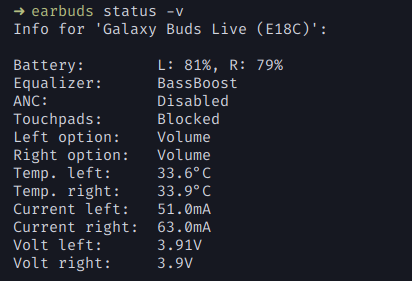A free cli tool to control your Galaxy buds live, Galaxy Buds+, Galaxy Buds Pro, Galaxy Buds 2 and Galaxy Buds 2 Pro
Note: This requires your buds to be up to date. Buds with old firmware aren't supported

|

|
- Equalizer, touchpad-lock and anc/ambient sound control
- Basic Buds status (battery, anc/ambient sound, current equalizer setting, ...)
- Changing touchpad tap action
- Advanced status informations (battery voltage/current, temperature)
- Auto music play/pause on bud remove (via mpris)
- Automatic sink switch (pulseaudio) [feature:
pulse-sink, used by default] - Desktop notifications (for low battery)
- Bash completion (for every shell)
- Connect/Disconnect your earbuds easily with a subcommand
- Multiple device support
- Individual device configs
- Json output for scripts (via
jq) - Change config options from cli
yay -S earbuds
Arch: bluez-libs libpulse dbus
Fedora: dbus-devel bluez-libs-devel
Run following command:
cargo install earbuds

You can display the status of your buds in your polybar with this script
To achieve this, you have to add following to your polybar config and move the script into your polybar script folder. Don't forget to add buds to the modules section.
[module/buds]
type = custom/script
interval = 8
label = %output%
exec = ~/.config/polybar/scripts/polybar.sh
click-middle = earbuds toggle anc
click-right = earbuds toggle touchpadlock
To get most of the features listed above, you need to have a daemon instance running (earbuds -d). If you run one of the commands
listed below, the daemon automatically gets started.
Status informations:
earbuds status
Set equalizer to Bass boost
earbuds set equalizer bass
Enable ANC
earbuds enable anc
Change ambient sound
earbuds set ambientsound <0-4> # 0: off 4: highest
Toggle noise reduction or the touchpad lock
earbuds toggle anc/touchpad
Get status in json format
earbuds status -o json
Set the left touchpad tap command to spotify
earbuds set tap-action spotify left
Connect/disconnect:
earbuds connect/disconnect
To debug the daemon run:
earbuds -k -d --no-fork
This kills the currently running daemon, creates a new one and starts it in the foreground.




